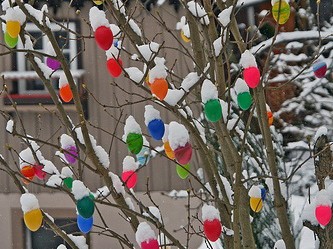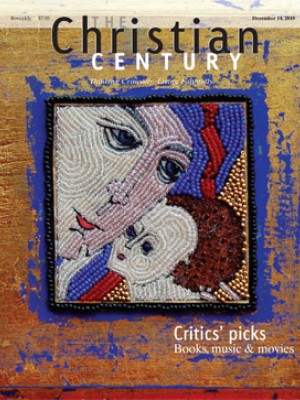The numbing season
Christmas is the numbing season. There are the ceaseless rounds of Christmas parties, each requiring preparation of food and gift-buying, each surfeited with expectations of obligatory Christmas cheer. There is the flood of commerce, requiring a careful parsing of which are the newest and most "necessary" toys or clothes for children and grandchildren. There are the travel and the visits to family, spiked with all the stresses attendant upon such endeavors. Finally (and almost as an afterthought), there are added church responsibilities of nativity programs, Christmas Eve services and so forth. No wonder many of us are likely to dread Christmas almost as much as we look forward to it.
Strangely, Christmas in our culture seems to have become the high holiday of Pelagianism. It brings in its tow so many responsibilities. And that includes the responsibility of salvation—if not for ourselves, then at least for the holiday itself. Each year, every year, we want the perfect Christmas, and we will be damned if we do not achieve it.
Read our latest issue or browse back issues.
I have the cure for the Christmas blues. It is called Easter.
On occasion it takes an outsider to remind us what is central to the Christian faith. So I turn to Rabbi Lawrence Hoffman for a salutary reminder. As Hoffman once wrote in Cross Currents,
Historians tell us that Christmas was not always the cultural fulcrum that balances Christian life. There was a time when Christians knew that the paschal mystery of death and resurrection was the center of Christian faith. It was Easter that really mattered, not Christmas. Only in the consumer-conscious nineteenth century did Christmas overtake Easter, becoming the centerpiece of popular piety. Madison Avenue marketed the change, and then colluded with the entertainment industry to boost Christmas to its current calendrical prominence.
The climax of the four Gospels is not Christmas, but the events we celebrate as Easter. One quarter to one half of the chapters in each of the four Gospels focus on Easter events. The Gospel traditions clearly see these as the crucial episodes or events that identify Jesus as God's Messiah. In fact, two of the four Gospels (Mark and John) have no nativity, or Christmas, narratives. This means that some of the earliest Christian communities knew no Christmas—at least not from their basic texts. We could be Christians without the stories of Christmas, but not without the stories of Easter.
To this day, Christian worship itself is marked by Easter more than by Christmas. For centuries, each Sunday has been known as a "little Easter." And consider the sacraments. Baptism is baptism into Christ's crucifixion and resurrection. The Eucharist hinges on a rehearsal of the endlessly rich themes of the paschal mystery.
In remembering these things, I do not mean to suggest that we should strike Christmas from the Christian calendar. But I do mean to put Christmas in proportion, in its proper place, which is a place overshadowed by Easter. Like Christmas, our cultural celebration of Easter has been highly hybridized or—put less charitably—paganized. So Easter presents its own problems. But in the willy-nilly developments of history, Easter as it is celebrated in our culture is a much less busy and stressful season than Christmas. We should take advantage of that reality. It is easier to focus on faith and discipleship during the Lent and Easter seasons than it is during Advent and Christmas. To lessen the load of Christmas, focus on Easter.
At the least, don't confuse the myriad obligations of the Christmas season as we know it with obligations of the Christian faith. Pressures to buy gifts by the boatload are pressures of the culture, not the faith. Pressures to prepare the flawless meal and pass through the holiday without a hint of family friction are not expectations or obligations of the faith. The pressure to keep up a relentless facade of merriment for a month or more is not a Christian pressure. We may not be able to completely escape these pressures and their effects, but perhaps we can lessen them by not confusing them with faith and discipleship.
Reoriented, we can then relax a bit more into Christmas. Let it be a time when we especially recall and ponder that Christmas—as a Christian holy day—is not about the gifts we give to others, but about the gift of God to humanity, to us. Maybe, then, in those moments of Advent desperation, we can pause and soak in a brief prayer of thanksgiving, something like this:
Gracious God, I am worn out and still wearing down. But this I know: the most precious gift of Christmas has already been given. It has been given to your beleaguered creation in Christ, your son and our salvation. Thank you for this, the ultimate gift. We accept it with joy. Amen.
When that isn't quite enough, remember: it may be Christmas—but Easter is coming.







